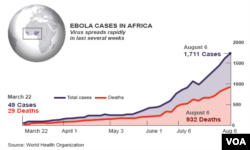Nigerian officials on Monday said one new Ebola case was diagnosed over the weekend, raising the country's total to 10 confirmed cases.
With the new Ebola case, the number of people who have come into contact with the disease has grown, and officials are now monitoring 177 people for signs of the disease.
Since a Liberian American financial consultant flew into Lagos from Liberia about three weeks ago, the number of new cases has slowly grown, increasing the number of people who may have been exposed, officials said.
Over the weekend, another patient was diagnosed in apparent connection with the Liberian American man, said Onyebuchi Chukwu, Nigerian Minster of Health.
“It was one of the nurses that were primary contacts when he got ill. We then brought her into isolation and we just tested her over the weekend and she tested positive," Chukwu said.
Ebola has killed nearly 1,000 people since the outbreak began early this year, with all but two deaths occurring in Liberia, Guinea and Sierra Leone.
Reports that experimental drugs have had success in treating American and European health workers and missionaries who contracted the disease in West Africa have prompted many Nigerians to demand access to the drugs in case it spreads further.
“Nigeria is actually, as of now, is reaching out to various laboratories, various governments, including the U.S.A. government to see how these untried ... drugs that seem to hold some hope could also be deployed in Nigeria. We’re in touch," Chukwu said.
The World Health Organization said it expects a vaccine to be developed by 2015, but currently there is no known cure.
Nigerian President Goodluck Jonathan Friday pledged $11.7 million dollars to try to stop the spread in Nigeria and $3.5 million to help other countries fight the disease.
Meanwhile, Nigerian officials continue a massive communications campaign to squash the equally massive rumor mill.
Rumors
People hear rumors that drinking salt water or eating a certain fruit will help prevent contracting Ebola. But local news has reported stories of people across Nigeria who have been sickened by drinking too much salt water or eating too much of a certain fruit.
On a daily basis, officials speak publicly about how to keep from getting Ebola, which is transmitted through contact with bodily fluids, such as blood, urine or sweat. It cannot be transmitted through air, the health minister said.
“If you are in close contact and someone who is suffering from it [Ebola], is sneezing or coughing into your face, you could also get it because the droplets can touch you. So that close contact makes it - that's why people say it’s not air borne - because you need that close contact," Chukwu said.
He urged people to wash their hands frequently, especially after touching another person and said, so far in Nigeria, the disease has not spread out of Lagos, a megacity of 21 million people that is often called the "heartbeat" of the Nigerian economy.






